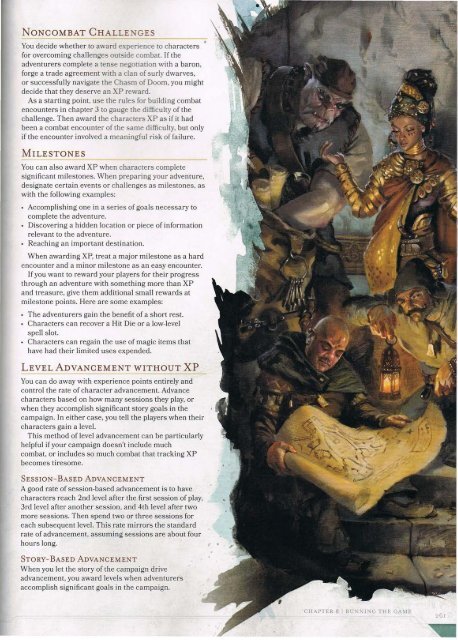Dungeon Master's Guide
Create successful ePaper yourself
Turn your PDF publications into a flip-book with our unique Google optimized e-Paper software.
NONCOMBAT CHALLE .. GES<br />
------:-<br />
You decide whether to award experience to characters<br />
for overcoming challenges out ide combat. If the<br />
adventurers complete a ten e negotiation with a baron,<br />
forge a trade agreement with a clan of surly dwarves,<br />
or successfully navigate the Chasm of Doom, you might<br />
decide that they deserve an XP reward.<br />
As a starting point, use the rules for building combat<br />
encounters in chapter 3 to gauge the difficulty of the<br />
challenge. Then award the characters XP as if it had<br />
been a combat encounter of the same difficulty, but only<br />
if the encounter involved a meaningful risk of fa ilure.<br />
MILESTONES<br />
You can also award XP when characters complete<br />
significant milestones. When preparing your adventure,<br />
designate certain events or challenges as milestones, as<br />
with the following examples:<br />
Accomplishing one in a series of goals necessary to<br />
complete the adventure.<br />
Discovering a hidden location or piece of information<br />
relevant to the adventure.<br />
Reaching an important destination.<br />
When awarding XP, treat a major milestone as a hard<br />
encounter and a minor milestone as an easy encounter.<br />
If you want to reward your players for their progress<br />
through an adventure with something more than XP<br />
and treasure, give them additional small rewards at<br />
milestone points. Here are some examples:<br />
The adventurers gain the benefit of a short rest.<br />
Characters can recover a Hit Die or a low-level<br />
spell slot.<br />
Characters can regain the use of magic items that<br />
have had their limited uses expended.<br />
LEVEL ADVANCEMENT WITHOUT XP<br />
You can do away with experience points entirely and<br />
control the rate of character advancement. Advance<br />
characters based on how many sessions they play, or<br />
when they accomplish significant story goals in the<br />
campaign. In either case, you tell the players when their<br />
characters gain a level.<br />
This method of level advancement can be particularly<br />
helpful if your campaign doesn't include much<br />
combat, or includes so much combat that tracking XP<br />
becomes tiresome.<br />
SESSION-BASED ADVANCEMENT<br />
A good rate of session-based advancement is to have<br />
characters reach 2nd level after the first session of play,<br />
3rd level after another session, and 4th level after two<br />
more sessions. Then spend two or three sessions for<br />
each subsequent level. This rate mirrors the standard<br />
rate of advancement, assuming sessions are about four<br />
hours long.<br />
STORY-BASED ADVANCEMENT<br />
When you let the story of the campaign drive<br />
advancement, you award levels when adventurers<br />
accomplish significant goals in the campaign.<br />
CHAPTER 8 I RUNNING THE GAME<br />
26!




